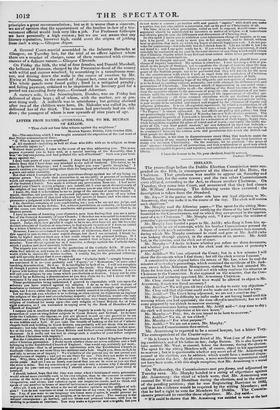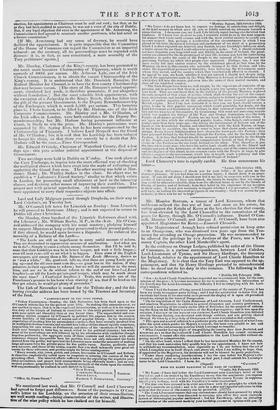IRELAND.
The proceedings before the Dublin Election Commission were sus. pended on the 16th, in consequence of the illness of Mr. Haire, the Chairman. That gentleman was unable to appear on Saturday and 'Monday last, fur the same reason ; and the two other Commissioners were obliged, according to the Act, to choose another Chairman. Oa Tuesday, they came into Court, and announced that they had chosen Mr. William Armstrong. The following scene then occurred : the description is taken from the Standard.
Mr. Joy—" If the parties on either side have any legal objection to Mr. Annstrong, they can make it in the course of the day. The clerk will receive such objections." Mr. Murphy read the following paper—" The agent for the sitting Mem- bers requires to inspect the document certifying the illness of the late Chairman) furnished to the Commissioners, and on which they now-proceed in the appoint- ment of a new Chairman." Mr. Murphy said, " I also acquire the minutes of yesterday's proceedings to be read." Mr. Murphy here handed a paper to Mr. Ardill ; who flung it from him ap- parently with an air of contempt, while his brother Commissioner perused the Standard with nuich earnestness. A lapse of several minutes here occurred; during which Mr. Murphy continued to stand and gaze at Mr. Ardill (who was looking through papers), in the expectation of an answer. Mr. Ardill had, in the interim, scut the clerk out of court. Mr. Murphy—" I desire to know whether you refuse me those documents, and whether you also left's° to let the clerk read the minutes of yesterday's proceedings ?" Mr. Ardill—" We have adjourned the Court ; but in a few minutes I will show the documents when I find them ; but till the clerk returns I cannot." A considerable time elapsed before the return of Mr. Lee, when he read the minutes of yesterday's proceedings, which contained the certificate of Dr. Jack- son, moan before Alderman Montgomery, stating that he had attended Mr. I laire for four days, and that he could not with safety continue his situation as Chairman to the Comntision. It also appeared on the minutes, that the Com- missioners had yesterday appointed Mr. Armstrong Chairman. Mr. Close desired to know what time would be allowed to object to Mr. Anustning, if such was found necessary ? Mr. Ardill--" We will give till two o'clock to-day to enter any objections." Mr. Close said that objections could not be made out in so limited a time. Mr. Ardill—" The Court being adjourned, we are not a court to-day." Mr. Murphy—" The difficulty we suffer under is not having heard until this morning whom you had appointed; the time offered is insufficient ; but we wilt come prepared by ten o'clock to-morrow morning." The Comrnissiouets having consulted, Mr. Ardill said—" Any time to-day; the clerk will receive objections at his own house." Mr. Murphy—" Pray, Sir, do you intend to be here to-morrow." Mr. We do, at ten o'clock."
Mr. Murphy—" For what purpose?"
Mr. Ardill—" We are not a court, Mr. Murphy."
The learned Commissioners then retired.
Mr. Armstrong is reported to be a sound lawyer, but a bitter Tory.
The correspondent of the Courier says- " He is known to be the intimate friend of Mr. West (one of the petition- ing candidates), and of his father-in -law, Judge Burton. He is also known to have assisted Mr. West, as counsel, before the Assessor, during the election. The agent for the sitting Members will, of course, object to his appointment to-morrow ; but it is questionable whether any overt act of Mr. Armstrong 113 counsel at the election, can be adduced, which would form a material disqua- lification under the Act. At all events, a more mischievous appointment could not have been made, with this single exception, that Mr. Armstrong is a sound lawyer." On Wednesday, the Commissioners met pro forma, and adjourned to Tuesday next. 111r. Murphy banded in a string of objections against Mr. Armstrong: the chief of which were, that Mr. Armstrong was counsel for West and Hamilton during the election, and in the matter of the pending petition ; that he was Registering Barrister in 1832. and that his evidence would be required by the sitting Members; and that he had a right to vote for Members for Dublin. The Commis- sioners promised to consider these objections. Mr. Joy maid- s. If it could be shown that Mr. Armstrong was entitled to vote at the last election, his appointment as Chairman must be null and void ; but that, as far as they had been enabled to ascertain, lie was not a voter of the city of Dublin. But, if any legal objection did exist to the appointment of Mr. Armstrong, the Commissioners had agreed to nominate another gentlemen, who had acted on a former commission."
[If Mr. Armstrong had any sense of decency, he would have declined the appointment. It is quite impossible that the Committee of the House of Commons can regard the Commission as an impartial tribunal : on the contrary, all its procceedings must be regarded with distrust: it is, in fact, as now constituted, a mere assembly of the Tory petitioners agents.]



























 Previous page
Previous page